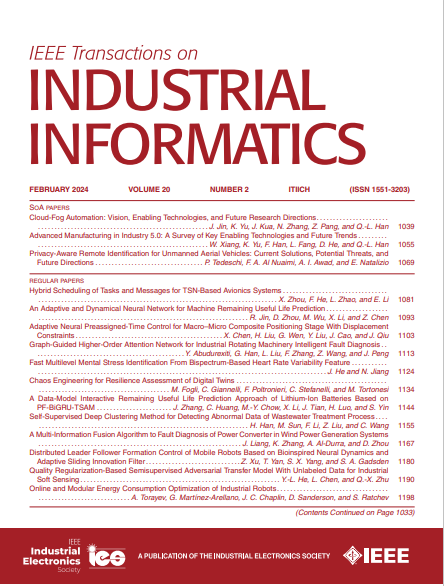基于云的自修复和容错数字孪生处理管理模型
IF 9.9
1区 计算机科学
Q1 AUTOMATION & CONTROL SYSTEMS
引用次数: 0
摘要
数字孪生(DTs)是云平台不可或缺的一部分,架起了物理世界和虚拟世界的桥梁,促进了制造和加工领域利益相关者之间的协作。然而,云平台面临着服务中断、漏洞和资源争用等挑战,阻碍了关键的DT应用程序开发。现有的研究工作主要集中在DT处理的可靠性和容错性方面。在此背景下,本文提出了一种新的基于自修复和容错云的数字孪生处理管理(SF-DTM)模型。它采用了协作式DT任务资源需求估计单元,该单元利用了新设计的余弦相似积分联合学习。此外,SF-DTM结合了一种自修复容错策略,该策略采用了一个频繁序列易出错模式分析单元来决定最可接受的虚拟机(VM)分配。与非SF-DTM方法相比,使用真实轨迹的SF-DTM模型的实施和评估证明了其有效性和弹性,揭示了改进的可用性、更高的平均故障间隔时间和更短的平均修复时间,增强了协同DT应用管理。与非基于SF-DTM的DT处理相比,SF-DTM将服务可用性提高了13.2%。本文章由计算机程序翻译,如有差异,请以英文原文为准。
A Self-Healing and Fault-Tolerant Cloud-Based Digital Twin Processing Management Model
Digital twins (DTs), integral to cloud platforms, bridge physical and virtual worlds, fostering collaboration among stakeholders in manufacturing and processing. However, the cloud platforms face challenges such as service outages, vulnerabilities, and resource contention, hindering critical DT application development. The existing research works have limited focus on reliability and fault tolerance in DT processing. In this context, this article proposed a novel self-healing and fault-tolerant cloud-based digital twin processing management (SF-DTM) model. It employs collaborative DT tasks resource requirement estimation unit that utilizes newly devised federated learning with cosine similarity integration. Furthermore, SF-DTM incorporates a self-healing fault-tolerance strategy employing a frequent sequence fault-prone pattern analytics unit for deciding the most admissible virtual machine (VM) allocation. The implementation and evaluation of the SF-DTM model using real traces demonstrates its effectiveness and resilience, revealing improved availability, higher mean time between failure, and lower mean time to repair compared with non-SF-DTM approaches, enhancing collaborative DT application management. SF-DTM improved the services availability up to 13.2% over non-SF-DTM-based DT processing.
求助全文
通过发布文献求助,成功后即可免费获取论文全文。
去求助
来源期刊

IEEE Transactions on Industrial Informatics
工程技术-工程:工业
CiteScore
24.10
自引率
8.90%
发文量
1202
审稿时长
5.1 months
期刊介绍:
The IEEE Transactions on Industrial Informatics is a multidisciplinary journal dedicated to publishing technical papers that connect theory with practical applications of informatics in industrial settings. It focuses on the utilization of information in intelligent, distributed, and agile industrial automation and control systems. The scope includes topics such as knowledge-based and AI-enhanced automation, intelligent computer control systems, flexible and collaborative manufacturing, industrial informatics in software-defined vehicles and robotics, computer vision, industrial cyber-physical and industrial IoT systems, real-time and networked embedded systems, security in industrial processes, industrial communications, systems interoperability, and human-machine interaction.
 求助内容:
求助内容: 应助结果提醒方式:
应助结果提醒方式:


